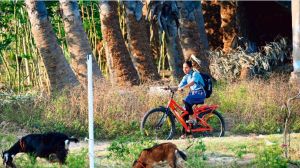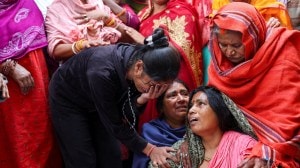Belgian court approves Mehul Choksi extradition: 5 things to know about PNB scam, cases against diamond trader
The order came a month after the Indian government gave a letter of assurance to the Belgian government that described the conditions in which the fugitive diamond trader would be incarcerated in India if he were to be extradited. Here is what to know.
 Choksi may now appeal against the Court of Appeal’s preliminary judgment before the Belgian Supreme Court in the next 15 days, a source told The Indian Express. (File photo)
Choksi may now appeal against the Court of Appeal’s preliminary judgment before the Belgian Supreme Court in the next 15 days, a source told The Indian Express. (File photo)Five months after his arrest, a court in Antwerp, Belgium, approved the extradition of Mehul Choksi, the fugitive diamond trader wanted in the Rs 13,000 crore Punjab National Bank loan fraud case.
Choksi may now appeal against the Court of Appeal’s preliminary judgment before the Belgian Supreme Court in the next 15 days, a source told The Indian Express.
The order came a month after the Indian government gave a letter of assurance to the Belgian government that described the conditions in which the fugitive diamond trader would be incarcerated in India if he were to be extradited. Here is what to know.
1. The case against Choksi
Choksi, who hails from a family of diamantaires, expanded his family business under the aegis of the Gitanjali Group, opening fancy stores across India and abroad. He operated this business with his nephew Nirav Modi, and splurged on marketing, with ads featuring the likes of Kate Winslet and Rosie Huntington-Whiteley. The majority of this was funded by loans from the PNB.
According to the Central Bureau of Investigation (CBI) and the Enforcement Directorate (ED), the duo opted not to repay their loans, and instead colluded with bank officials to fraudulently secure Letters of Understanding (LoUs) from the Brady House branch of the PNB in Mumbai between 2014 and 2017. They used the LoUs to avail credit on foreign shores to expand their business and personal wealth.
While the LoUs were supposed to be repaid in three months, these were renewed with interest by the colluding bank officials, ensuring a continuous flow of liquidity for the two jewellers even as the debt kept piling up.
By the time the PNB discovered the irregularities and approached the CBI, both Choksi and Modi had fled the country, after setting the bank back by over Rs 13,500 crore. Choksi alone is accused of defrauding the bank of over Rs 6,000 crore.
After the case was registered, the ED attached Choksi’s assets, including the diamonds in his stores, claiming them to be of value exceeding Rs 5,000 crore. However, a laboratory examination of the diamonds revealed that most of them were fake. The real value of Choksi’s assets, including all his properties and investments, today stands at around Rs 2,500 crore.
2. The charges against Choksi and Nirav Modi
Choksi is facing criminal proceedings by both the CBI and ED.
In 2018, the CBI named Choksi and his firms, including Gitanjali Gems, based on a complaint received by Punjab National Bank (PNB) for the alleged issuance of fraudulent Letters of Undertaking in their favour, causing losses to the bank.
The ED subsequently filed a complaint alleging that Choksi and others were involved in money laundering the proceeds of crime in overseas accounts.
Choksi has been booked under the Prevention of Money Laundering Act and other sections pertaining to cheating, criminal conspiracy of the Indian Penal Code and relevant sections of the Prevention of Corruption Act.
Nirav Modi has also been charged in a similar case, alleging that the duo colluded with some PNB officials to perpetuate the multi-crore fraud.
A 2018 appeal by the ED under the Fugitive Economic Offenders Act remains pending. If Choksi is declared a fugitive economic offender and does not return to India, his properties can be confiscated even before the trial against him begins.
3. How Choksi ended up in Belgium
Choksi was initially in Antigua and Barbuda in the eastern Caribbean, where he had fled once the scam came to light. He had taken the country’s citizenship in November 2017 through an investment for citizenship programme, and according to the ED, he left India on January 2, 2018, days before an FIR was filed in the case.
Of note, India does not have an extradition treaty with Antigua and Barbuda, but an “extradition arrangement [has been] in place since 2001.”
Even as attempts were made to get Choksi extradited through legal means, India was accused in 2021 of plotting a secret operation to get Choksi back to the country. That May, his family and lawyers alleged that he had been “kidnapped by Indian agents” on May 23 by trapping him through a Hungarian woman. He was then allegedly ferried to Dominica in a yacht by two Indians, where he was later apprehended for illegal entry. India appealed to Dominica for extradition, but Choksi was sent back to Antigua and Barbuda.
In 2024, Choksi relocated to Antwerp, Belgium, for cancer treatment. His wife, Preeti, is a Belgian citizen, and he reportedly obtained an ‘F Card’ to stay in the country, which is issued to family members of European Union citizens.
He was arrested on April 11 following the CBI’s extradition request, and has been lodged in Antwerp Prison ever since. Last month, a Belgian court turned down Choksi’s bail plea, just ahead of his extradition hearing.
4. What to know about the extradition process
Extradition is a formal process through which one country hands over a person accused or convicted of a crime to another country. It ensures that a person can not avoid trial simply by crossing borders.
According to the Ministry of External Affairs, India has extradition treaties with 48 countries, and extradition arrangements (without a formal treaty) with an additional 12 countries. We have written about the conditions for extradition here.
India has had an extradition treaty with Belgium in place since 1901, which emphasises extradition based on “dual criminality”, including for financial crimes. Dual criminality means that an individual can be extradited only if their offence is punishable in both jurisdictions involved.
The treaty, however, prohibits extradition for offences of a political nature or in cases where the individual in question can prove she is being prosecuted in the requesting country for political reasons. It also says that the fugitive arrested shall be released if the requesting country fails to present evidence of culpability within two months.
In 2020, India and Belgium signed the Mutual Legal Assistance Treaty for better cooperation on fugitives.
5. Choksi’s arguments against extradition, and assurance by Indian government
In the past, Choksi’s lawyers have argued that he would not receive due process in India. They have also flagged allegations of human rights violations and poor prison conditions in the country, as well as his poor health, to oppose extradition.
The Dominican episode too, was a likely bone of contention. His lawyers had then alleged that Choksi had been coerced into signing a consent form saying he would return to India of his own will, in a bid to bypass the lack of a treaty with Antigua.
On September 4, Rakesh Kumar Pandey, Joint Secretary, Ministry of Home Affairs, wrote to the Belgian authorities, providing assurances of the quality of Choksi’s incarceration were the latter to be extradited.
“The Centre… assures that Choksi will be held at Barrack No. 12, Arthur Road jail complex. It is also assured that he will be kept in a cell in which he will get a minimum of three square meters of personal space (not including furniture) throughout the period of his prospective detention (pre-trial and post-conviction) in case he is found guilty,” Pandey wrote.
In his letter, Pandey also assured that the detention centre in which he is to be kept has provisions for a clean, thick cotton mat, pillow, bedsheet, and blanket. “A metal frame/wooden bed can also be provided on medical grounds. Adequate light, ventilation and storage for permitted personal belongings are available,” the officer added in the letter.


- 01
- 02
- 03
- 04
- 05




































